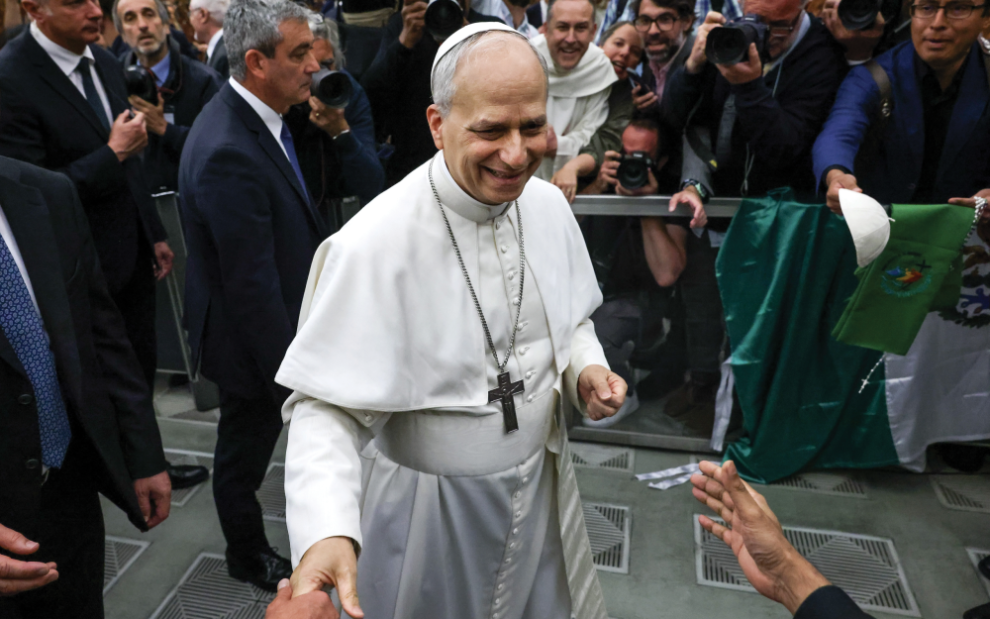“In a divided world, the Holy Spirit teaches us to walk together in unity,” said Pope Leo XIV in his homily for Pentecost. The theme of unity has been one of the most prominent themes of the new papacy. In his first message, Leo spoke of the importance of “building bridges,” the literal meaning of the title “pontifex,” in order to join together “as one people, always at peace.”
There are many different foundations on which unity can be built. For example, I feel very united with our new pope, because, like him, I was born and raised in Chicago. But of course one’s native land cannot be a sufficient basis for unity.
The pope’s motto, drawn from St. Augustine, gives us the key to unity: “In the one Christ, we are one.” In his first official address to the College of Cardinals, Leo listed “the return to the primacy of Christ in proclamation” as the first characteristic of Second Vatican Council renewal. His first homily was on the reading in which Peter is asked by Jesus: “Who do you say I am?” Peter’s answer—the Christ, God’s anointed one—is what brings forth Jesus’ statement that he will be the rock on which the church is built.
How can Christ be the basis for unity when we live in a society with so many different religious beliefs? In asking this question, we risk moving too quickly to abstract questions about society, when we first should look at ourselves as Catholics and say: How can we be unified? Indeed, this is how God brings about unity in the world—through the mystery of choosing a people to live out unity in service to all.
An oft-neglected teaching of Vatican II is the beautiful idea that the church itself is a sacrament. This may seem like an odd idea at first. But sacraments aren’t just rituals; they are effective signs—that is, signs that also effect what they signify. A stop sign doesn’t make your car stop, but the Eucharist brings about the unity with Christ and the entire body of the church that it signifies. This is because, ultimately, the “effectiveness” of the sacraments is that God is at work.
In the first paragraph of Vatican II’s constitution on the church, the Council states, “the church is in Christ like a sacrament or as a sign and instrument both of a very closely knit union with God and of the unity of the whole human race.” The church is a sacrament of unity. First and foremost, union with God in Christ. But just as love of God cannot be separated from love of neighbor, so too union with God cannot be separated from unity with all of humanity. The church not only signals this unity but is an “instrument,” effectively bringing it about.
The papal election was an occasion to marvel at how true this is. Cardinals came together from every corner of the globe, every people and tongue, in order to elect a successor of Peter. The world press converged on Rome with an attention that it rarely gives to religion or an international election. In his encyclical on hope, Pope Benedict insisted that the salvation promised by the gospel is not a solitary, individual hope; it is a communal hope that humanity will again be gathered together. He writes:
Sin is understood by the fathers [the writers of the early church] as the destruction of the unity of the human race, as fragmentation and division. Babel . . . the place of separation, is seen to be an expression of what sin fundamentally is. Hence “redemption” appears as the reestablishment of unity, in which we come together once more in a union that begins to take shape in the world community of believers.
What we glimpse at Mass every Sunday is “heaven,” in the sense of the gathering of all at the feast of the lamb.
This unity must shine in every part of our lives as Catholics. Too often, we bring in divisions from the world. Our divided worldly identities then divide us within the church. This is not a new problem; St. Paul writes frequently to remind his communities that unity in Christ trumps all worldly differences and identities. It doesn’t do so by erasing them, but rather by removing everything in them that is a source of conflict and division.
This unity is not an easy path. One of Paul’s most interesting teachings to the fractious Corinthians is that they should stop suing one another in Roman courts. Better to be defrauded, he says, than to bring quarrels about justice before pagan judges. Of course, he thinks it’s better if Christians can resolve those conflicts within the community. Being one in Christ doesn’t eliminate conflict. But it changes the whole way we approach it.
In his first major message Evangelii Gaudium (On the Proclamation of the Gospel in Today’s World), one of Pope Francis’ basic principles for social order is “unity prevails over conflict.” Building “communion amid disagreement . . . can only be achieved by those great persons who are willing to go beyond the surface of the conflict and to see others in their deepest dignity.” What can emerge out of such conflict is a deeper sense of unity, a search for a broader and deeper vision of human communion.
But this must be done, Francis maintained, in Christ. He goes on to say that unity prevails because “Christ has made all things one in himself.” Thus, unity is not a matter of letting everyone do their own thing, letting every flower bloom. Some things are manifestations of sin and division—when the church condemns consumerism or sexual promiscuity or nationalism or abortion or euthanasia, it is witnessing to unity, not contradicting it. These sins divide humans into the haves and the have-nots, the worthy and the worthless, the powerful and the weak.
Yet on every side of these very real conflicts, we still have human beings. We do not fight monsters to be vanquished and eliminated. We face other human beings created in the image of God. Seeking unity, what we aim at is not victory but peace.
Thus, in their appeals for unity, both Francis and Leo point to the beatitude, “Blessed are the peacemakers.” In an address to the media soon after his election, Leo used that beatitude to remind us all that “the way we communicate is of fundamental importance: We must say ‘no’ to the war of words and images, we must reject the paradigm of war. . . . Let us disarm words and we will help to disarm the world.” With that in mind, let every word we speak—perhaps especially our virtual words—aim at the greater unity of all people, of which the church should be an effective sign.
This article also appears in the September 2025 issue of U.S. Catholic (Vol. 90, No. 9, pages 40-41). Click here to subscribe to the magazine.
Image: Shutterstock.com/Alessia Pierdomenico













Add comment